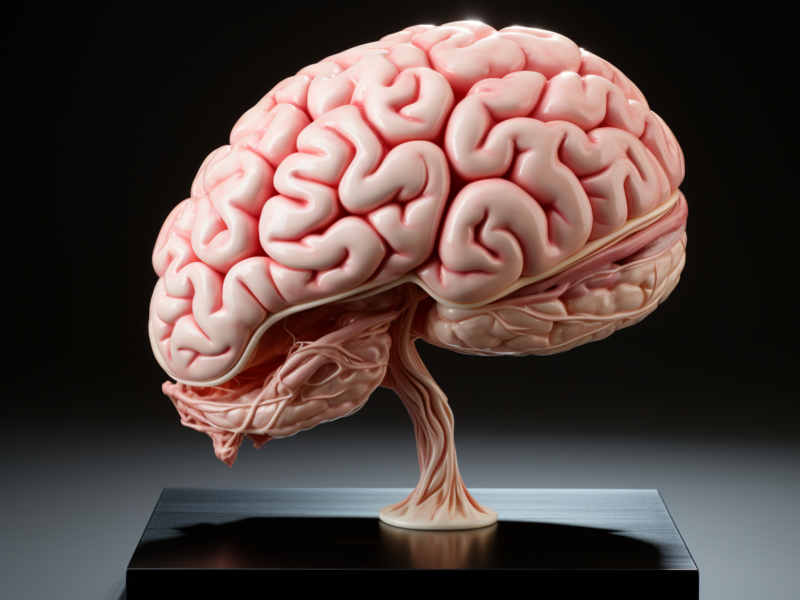As we age, cognitive decline becomes an increasingly common concern. With advancements in medical research, a variety of factors have been identified that contribute to this gradual deterioration. One such factor is the role of GABA – Gamma-Aminobutyric Acid, an inhibitory neurotransmitter in our brain. In recent years, researchers have delved into understanding how GABA levels change as we age and its impact on cognitive function. This article aims to explore the relationship between GABA and age-related cognitive decline, shedding light on potential therapeutic interventions that could potentially slow down or even reverse this decline in older adults.
The Role of GABA in Cognitive Function
Cognitive decline is a growing concern as individuals age, and research has identified various factors that contribute to this deterioration.
One such factor is the role of GABA – Gamma-Aminobutyric Acid, an inhibitory neurotransmitter in the brain.

In recent years, researchers have been investigating how GABA levels change with age and its impact on cognitive function.
This article aims to explore the relationship between GABA and age-related cognitive decline, while also providing insights into potential therapeutic interventions that could be beneficial. GABA plays a crucial role in regulating neuronal activity by inhibiting excessive firing of neurons in the brain.
As we age, there is evidence to suggest that GABAergic signaling becomes dysregulated, leading to imbalances in excitatory-inhibitory processes within neural circuits involved in cognition.
Studies have shown that reduced levels of GABA are associated with declining cognitive function and increased vulnerability to neurodegenerative diseases such as Alzheimer’s disease.
Understanding the intricate involvement of GABA in cognitive function provides opportunities for therapeutic interventions aimed at ameliorating age-related cognitive decline. Strategies targeting GABA modulation through pharmacological agents or non-pharmacological approaches like mind-body practices may hold promise for enhancing cognition and delaying or preventing further deterioration. Continued research into the intricate mechanisms underlying GABA’s role will likely pave the way for innovative treatments and strategies tailored towards preserving cognitive health throughout aging.
GABA Levels and Aging: A Comprehensive Overview
As we age, cognitive decline becomes an increasingly prevalent concern. Extensive research has identified various factors contributing to this decline, with one of them being the role of GABA – Gamma-Aminobutyric Acid, an inhibitory neurotransmitter in the brain. Recent studies have focused on understanding how GABA levels change as we age and its impact on cognitive function. This comprehensive article aims to explore the relationship between GABA and age-related cognitive decline while shedding light on potential therapeutic interventions that could potentially mitigate these effects.
GABA is a crucial neurotransmitter that regulates brain excitability and plays a crucial role in maintaining neural homeostasis. As individuals grow older, disturbances in GABA signaling can occur, leading to imbalances and disruptions within the brain’s neuronal networks. These changes have been associated with declines in memory, attention, and overall cognitive function observed in aging populations. Understanding these alterations in GABA levels is essential for developing targeted interventions aimed at preserving or improving cognitive abilities during aging.
The exploration of therapeutic strategies targeting GABAergic systems holds promise for addressing age-related cognitive decline. By modulating GABA levels through pharmacological agents or non-pharmacological approaches such as exercise or meditation practices, researchers aim to enhance neural plasticity and promote healthy brain aging. Additionally, elucidating the intricate mechanisms underlying GABA’s involvement in cognition may contribute to the development of novel treatment avenues that could alleviate cognitive impairments commonly experienced during aging.
Impact of GABA on Age-Related Cognitive Decline
Cognitive decline is a prevalent concern as individuals age, and researchers have uncovered various factors that contribute to this deterioration. Among these, the role of GABA – Gamma-Aminobutyric Acid, an inhibitory neurotransmitter in the brain – has garnered attention. Recent studies have focused on investigating how GABA levels change with age and their influence on cognitive function. This article aims to explore the relationship between GABA and age-related cognitive decline, potentially uncovering therapeutic interventions for this issue.
GABA serves as a crucial modulator of neuronal activity, playing a significant role in regulating excitability in the brain. As individuals age, there is mounting evidence suggesting a decline in GABAergic neurotransmission and subsequent alterations in cognitive processes such as memory formation and attention span. Researchers suggest that reduced GABA activity may disrupt neural networks involved in information processing leading to impairments in cognition.
Understanding the impact of GABA on age-related cognitive decline could provide avenues for potential therapeutic interventions. By targeting mechanisms that regulate GABA modulation or exploring pharmacological approaches to enhance its activity, it may be possible to mitigate or reverse cognitive impairments associated with aging. Further research into this complex relationship is needed to develop effective strategies for maintaining optimal cognitive function throughout the lifespan.
Mechanisms of GABA Dysregulation in Aging Brain
Aging is accompanied by a decline in cognitive function, and researchers have identified various factors that contribute to this process. One important mechanism involves the dysregulation of GABA – Gamma-Aminobutyric Acid, an inhibitory neurotransmitter present in our brain. Extensive research has focused on understanding how GABA levels change with age and their implications for cognitive abilities.
 GABA dysregulation in the aging brain occurs through several mechanisms. Firstly, there is a decrease in the synthesis and release of GABA due to alterations in enzymes responsible for its production.
GABA dysregulation in the aging brain occurs through several mechanisms. Firstly, there is a decrease in the synthesis and release of GABA due to alterations in enzymes responsible for its production.
Additionally, changes occur within GABA receptors, leading to reduced binding capacity and impaired signal transmission.
Moreover, age-related oxidative stress can negatively impact GABAergic neurons, further compromising their functioning.
These dysregulations of GABA have significant repercussions on cognition. For instance, decreased inhibitory signaling may result in increased neuronal excitability and impairments in learning and memory processes. Furthermore, alterations in the balance between excitatory and inhibitory neurotransmitters can disrupt information processing networks involved in attention and executive functions.
Understanding the mechanisms underlying GABA dysregulation offers potential targets for therapeutic interventions aimed at attenuating age-related cognitive decline. Strategies such as pharmacological modulation or lifestyle interventions targeting GABAergic pathways could provide valuable avenues for intervention and prevention strategies against age-associated cognitive deficits.
GABAergic Interventions for Cognitive Decline: Current Research
GABAergic interventions for cognitive decline are currently being researched as potential therapeutic interventions. GABA, an inhibitory neurotransmitter in the brain, has been found to play a role in age-related cognitive decline. Studies have shown that GABA levels change as we age, and this can impact cognitive function.
By understanding the relationship between GABA and cognitive decline, researchers hope to identify strategies to mitigate its effects. This could potentially involve developing medications or therapies that target GABA receptors in order to enhance cognition in older adults. However, further research is needed to fully understand how GABAergic interventions can be utilized effectively and safely for treating age-related cognitive decline.
The investigation into GABAergic interventions signifies a promising avenue of research for addressing age-related cognitive decline. By uncovering the mechanisms by which changes in GABA affect cognition, scientists are inching closer towards developing effective treatments for improving memory and mental sharpness in older individuals. While more studies are required before practical applications can be determined, these ongoing efforts offer hope for a future where cognitive decline may not have such devastating consequences on our aging population’s quality of life.

Potential Therapeutic Approaches Targeting GABA in Aging Brain
As we age, cognitive decline becomes an increasingly prevalent issue. Recent advancements in medical research have shed light on the role of GABA – Gamma-Aminobutyric Acid, an inhibitory neurotransmitter in the brain, in this process. Researchers have been studying how GABA levels change with age and its impact on cognitive function. Understanding this relationship between GABA and age-related cognitive decline has opened doors to potential therapeutic approaches targeting GABA.
By identifying the alterations in GABA levels during aging, researchers aim to develop interventions that can counteract cognitive decline. One possible approach is pharmacological modulation of GABA receptors using drugs that enhance or mimic its effects. This could potentially restore or improve cognitive function by modulating neural activity and improving overall brain health.
Another therapeutic avenue could involve non-pharmacological methods, such as lifestyle modifications or behavioral interventions, to influence GABA levels and enhance cognition in older adults. These may include activities like exercise, mindfulness practices, or dietary changes known to affect neurotransmitter systems associated with cognitive processes.
Overall, further research into the intricate relationship between GABA and age-related cognitive decline holds promise for developing targeted therapies that can help mitigate these debilitating effects of aging on cognition. By focusing on modulating GABAergic activity through various means, future treatments may provide new hope for maintaining optimal brain function throughout the aging process.
Future Directions: GABA and Cognitive Decline Research
As research on age-related cognitive decline advances, scientists are increasingly focusing on the role of GABA – Gamma-Aminobutyric Acid. GABA is an inhibitory neurotransmitter in the brain that regulates neural activity and helps maintain a balance between excitatory and inhibitory signals. Recent studies have shown that GABA levels tend to decrease as we age, leading to a disruption in this delicate balance and contributing to cognitive decline.
Understanding the relationship between GABA and cognitive decline has significant implications for potential therapeutic interventions. By targeting GABAergic pathways, researchers hope to develop novel treatments that could potentially slow down or even prevent age-related cognitive decline. Strategies such as pharmacological modulation of GABA receptors or enhancing endogenous production of GABA through lifestyle interventions hold promise for mitigating the negative effects associated with declining GABA levels.
Overall, further investigation into the link between GABA and age-related cognitive decline is crucial for unlocking new avenues in neurology research. The exploration of potential therapeutic interventions centered around modulating the functioning of this vital neurotransmitter presents an exciting direction for future discoveries aimed at preserving cognitive function during aging processes.
In Closing:
In the ongoing research into age-related cognitive decline, gamma-aminobutyric acid (GABA) has been identified as a key player. Healthy older adults often experience age-related declines in cognitive performance, including memory deficits and reduced fluid processing ability. Findings suggest that GABA, a neurotransmitter primarily known for its inhibitory role in the nervous system, may contribute significantly to these declines.

Specifically, research shows a significant correlation between GABA concentration in the frontal cortex and cognitive performance in older adults. Lower GABA levels were associated with poor cognition and more significant age-related declines. Furthermore, reductions in GABA within the occipital and visual cortex, areas critical for spatial and visual processing, are also associated with age-related impairments.
Importantly, individual differences in GABA concentration appear to predict these differences in cognitive abilities, suggesting the potential for personalized approaches to age-related cognitive interventions. Studies show a relationship between higher GABA concentrations and better performance on memory tests, suggesting that increasing GABA levels may serve as a potential intervention strategy for age-related cognitive decline.
However, despite these promising correlations, the cause-and-effect relationship between GABA and cognitive decline remains to be established. The hypothesis that age-related declines in GABA contribute to cognitive dysfunction warrants further investigation. Moreover, the specific contributions of GABA to learning, memory deficits, and other aspects of cognition are yet to be fully understood. Continued research in cognitive neuroscience, particularly into the GABA system, will help elucidate these relationships and inform strategies for mitigating age-related cognitive decline.
FAQs:
Q: What is the role of GABA in age-related cognitive decline?
A: GABA (gamma-aminobutyric acid) plays a critical role in age-related cognitive decline. Age-related changes in GABA concentrations have been associated with reduced fluid processing, memory deficits, and learning difficulties in older adults.
Q: How can GABA be measured in the brain?
A: GABA levels in the brain can be measured using magnetic resonance spectroscopy (MRS), a non-invasive imaging technique that can provide information about the concentration of various brain chemicals, including GABA.
Q: Are there age-related declines in occipital GABA?
A: Yes, studies have shown that GABA concentrations in the occipital cortex decline with age. These age-related reductions in occipital GABA have been associated with poor memory performance in older adults.
Q: What is the relationship between GABA and age-related cognitive decline?
A: The decline of GABA in the brain is associated with age-related cognitive decline. Reduced GABA function and expression have been found to contribute to age-related learning and memory deficits.
Q: What age-related changes in GABA have been observed in the cingulate cortex?
A: Research has revealed that there are age-related reductions of GABA in the cingulate cortex. These changes in GABA concentrations may be associated with cognitive decline in older adults.
Q: Is there a link between GABA and amnestic mild cognitive impairment (aMCI)?
A: Yes, studies have found a link between GABA and amnestic mild cognitive impairment (aMCI), a condition characterized by memory problems that are more severe than those expected with normal aging. Reduced GABA levels have been observed in individuals with aMCI.
Q: Is GABA release associated with age-related declines in cognitive performance?
A: Yes, research suggests that GABA release is associated with age-related declines in cognitive performance. Decreased GABA release has been linked to poor memory and cognitive function in older adults.
Q: What does the National Institute on Aging say about age-related GABA decline?
A: The National Institute on Aging recognizes that age-related GABA decline is associated with poor memory and cognitive performance in older adults. They support research towards personalized approaches to counteract these declines.
Q: How does GABA relate to age-related reductions in the cortex?
A: Age-related reductions in GABA have been observed in the cortex, which is the outer layer of the brain. These reductions may contribute to age-related cognitive decline and the development of memory deficits.
Q: Are there any GABA agonists that can potentially improve age-related cognitive decline?
A: GABA agonists, which are substances that enhance the activity of GABA receptors in the brain, have been investigated as a potential intervention for age-related cognitive decline. However, more research is needed to determine their effectiveness in improving cognitive function in older adults.



 GABA – Brain Health and Cognitive Function
GABA – Brain Health and Cognitive Function
